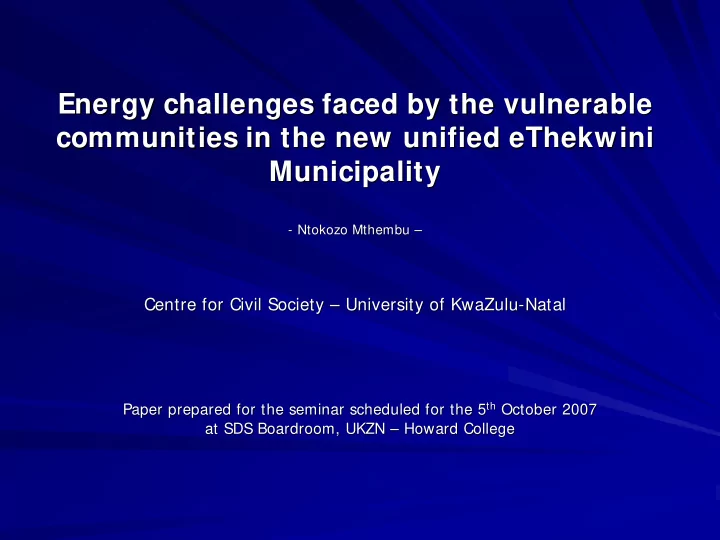

Energy challenges faced by the vulnerable Energy challenges faced by the vulnerable communities in the new unified eThekwini communities in the new unified eThekwini Municipality Municipality - Ntokozo Mthembu Ntokozo Mthembu – – - Centre for Civil Society – – University of KwaZulu University of KwaZulu- -Natal Natal Centre for Civil Society th October 2007 Paper prepared for the seminar scheduled for the 5 th Paper prepared for the seminar scheduled for the 5 October 2007 at SDS Boardroom, UKZN – – Howard College Howard College at SDS Boardroom, UKZN
“ Racially based access is still a predominant feature of access t “ Racially based access is still a predominant feature of access to energy within o energy within South African cities: the pattern of households within South African cities still ican cities still South African cities: the pattern of households within South Afr largely conforms to the characteristic smaller, previously, and still predominantly, white, still predominantly, white, largely conforms to the characteristic smaller, previously, and well- well -serviced, suburban component occupying cores within larger, larg serviced, suburban component occupying cores within larger, largely black ely black peri peri- - urban and, in some cities, rural settlements arranged on the his urban and, in some cities, rural settlements arranged on the historical township model torical township model” ” (I nclusive Cities, 2006:28). (I nclusive Cities, 2006:28).
Presentation Outline Presentation Outline Introduction Introduction Background Background Objectives Objectives Principal theories Principal theories Methodology Methodology Data Data Findings Findings Conclusion & Recommendations Conclusion & Recommendations
Introduction Introduction This report focuses on the community participation - - eThekwini eThekwini This report focuses on the community participation Municipality; Municipality; The study looks at the state - - to involvement of communities in to involvement of communities in The study looks at the state decision- -making making decision Conducted on the contested background on participation in decision on Conducted on the contested background on participation in decisi making of the communities in determining electricity making of the communities in determining electricity
Background Background The new city demarcations of eThekwini Municipality - - 2000 local government elections, Municipal 2000 local government elections, Municipal The new city demarcations of eThekwini Municipality Structures Act.- - unify different six local councils ; unify different six local councils ; Structures Act. With a specific focus - - improving service delivery, and driving economic growth and emp improving service delivery, and driving economic growth and employment loyment With a specific focus within the region (Joffe, 2006); within the region (Joffe, 2006); The eThekwini Municipality is surrounded The eThekwini Municipality is surrounded - - iLembe (north), the Indian iLembe (north), the Indian ocean(east ocean(east), ), Ugu(south Ugu(south) & ) & UMgungundlovu (west); population estimated to between 2 046 814 and 2753 479 and 2753 479 - - UMgungundlovu (west); population estimated to between 2 046 814 approximately 66.24% of total population of South Africa (Case, approximately 66.24% of total population of South Africa (Case, 2003), over 3 million people 2003), over 3 million people made up of Africans (65%) and the second Asians (21%); made up of Africans (65%) and the second Asians (21%); Casale and and Thurlow Thurlow (1999) (1999) - - about 40% of the households, regarded as being poor and ultra about 40% of the households, regarded as being poor and ultra- - Casale poor, about 20% of households poor, about 20% of households - - incomes between less than R1 156pm, incomes between less than R1 156pm, - -as ultra poor and a as ultra poor and a further 20% of households have incomes between R1 157 and R1 1834 4 – – poor; poor; further 20% of households have incomes between R1 157 and R1 183 The eThekwini The eThekwini - - increase of 7% in total income to R10bn during 2006 increase of 7% in total income to R10bn during 2006 – – facilitated by grant and facilitated by grant and subsidy funding (increased 38% to R1bn or 10% of total income and the average for respective d the average for respective subsidy funding (increased 38% to R1bn or 10% of total income an metropolitan municipalities (23%) and its ratepayers ( Rates income ome - -the largest component of the largest component of metropolitan municipalities (23%) and its ratepayers ( Rates inc total income for the first time over the review period, exceedin total income for the first time over the review period, exceeding electricity income); g electricity income); The eThekwini has been undergoing a process of converting the bulk of rates billed from ulk of rates billed from The eThekwini has been undergoing a process of converting the b annually to monthly like all other municipalities annually to monthly like all other municipalities - - end of 2006, a higher 82% of total billings were end of 2006, a higher 82% of total billings were payable monthly, which has resulted in a smoother cycle of cash in flows (Joffe, 2006); in flows (Joffe, 2006); payable monthly, which has resulted in a smoother cycle of cash
Objectives Objectives To expose the “ “democracy deficit democracy deficit” ”- - as it fails to link citizens, institutions and processes of the as it fails to link citizens, institutions and processes of the To expose the state, affecting the quality of livelihood and resulting in redu state, affecting the quality of livelihood and resulting in reduced accountability (Hicks, 2006) ced accountability (Hicks, 2006) To assess community participation in the determining pricing of electricity/ energy; electricity/ energy; To assess community participation in the determining pricing of To expose and document challenges faced by the previously disadvantaged communities relation antaged communities relation To expose and document challenges faced by the previously disadv to energy consumption; to energy consumption; To assess whether the highly celebrated changes in eThekwini Municipality are any significant to icipality are any significant to To assess whether the highly celebrated changes in eThekwini Mun the vulnerable communities; the vulnerable communities;
Recommend
More recommend